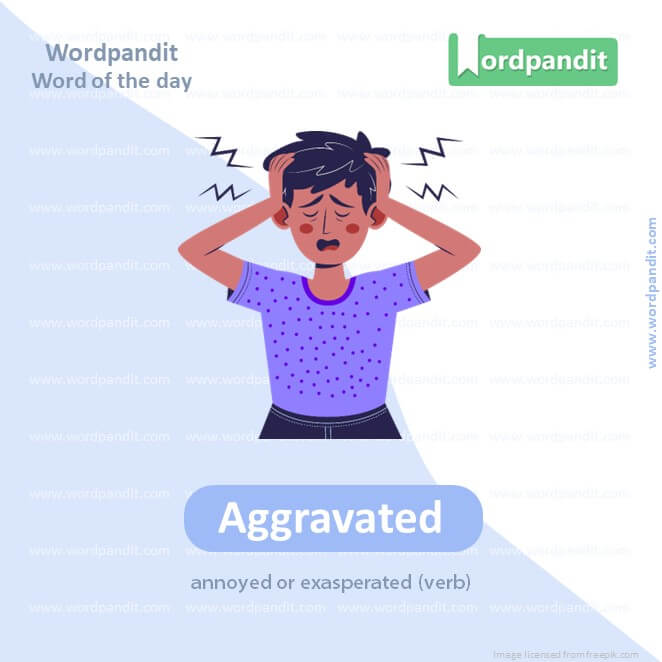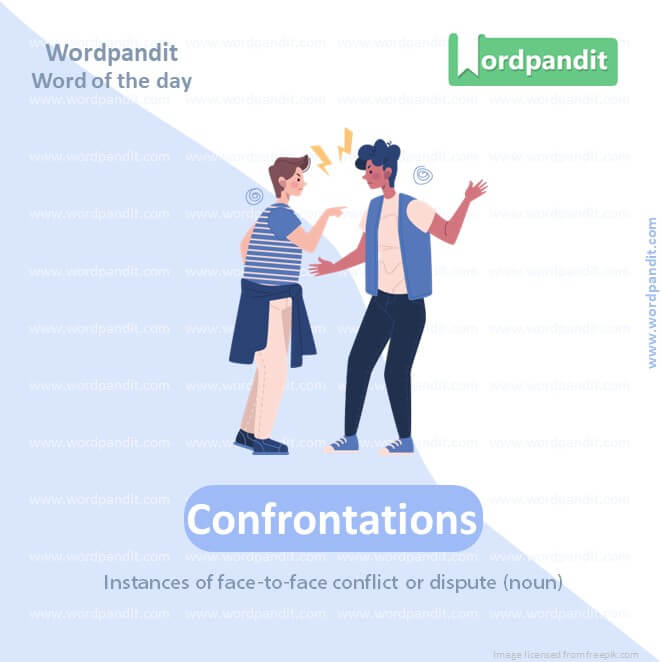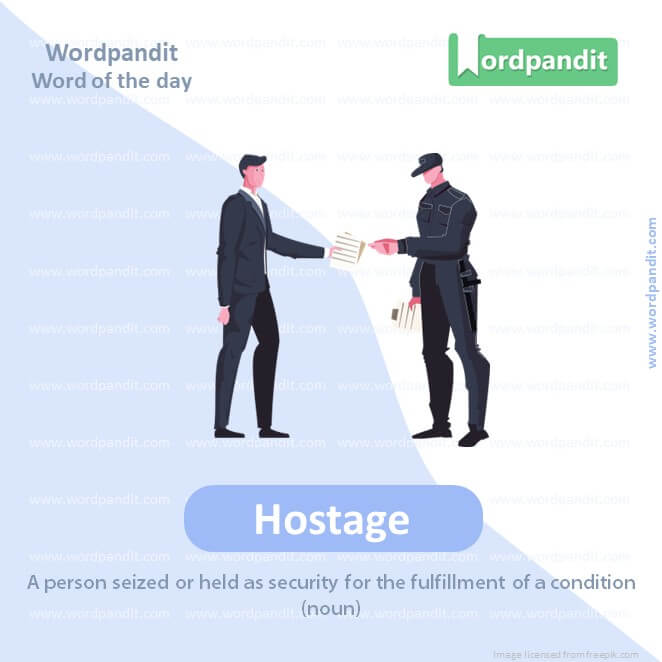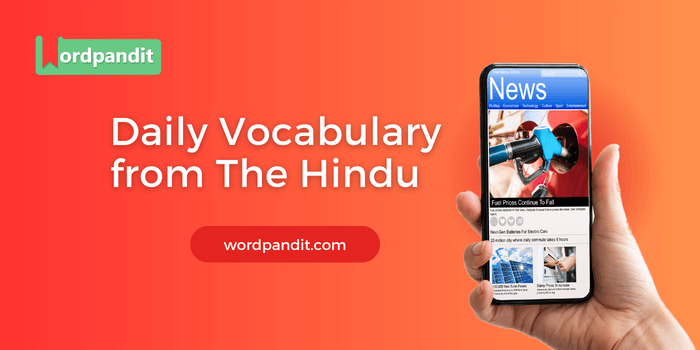Daily Vocabulary Words: List of Daily Used Words
Hi there. Welcome to this special section @ Wordpandit.
Our endeavour here is straightforward: highlighting important daily vocabulary words, you would encounter in The Hindu. This is your repository of commonly used words; essentially, we are posting a list of daily used words. Hence, this has significant practical application as it teaches you words that are commonly used in a leading publication such as The Hindu.
Visit the website daily to learn words from The Hindu.

WORD-1: AGGRAVATED
CONTEXT: Following the incident, the attacker was arrested and is facing charges of aggravated battery with a deadly weapon and attempted murder.
SOURCE: The Hindu
EXPLANATORY PARAGRAPH: “Aggravated” is like when something bad gets even worse. It’s like having a small cut, and then it gets more painful because you accidentally scratch it.
MEANING: Made worse or more serious (adjective); annoyed or exasperated (verb).
PRONUNCIATION: AG-ruh-vay-tid
SYNONYMS: Worsened, Intensified, Exacerbated, Heightened, Amplified
USAGE EXAMPLES:
1. His behavior aggravated the situation.
2. The loud noise aggravated her headache.
3. He felt aggravated by the constant delays.
4. The crime was an aggravated assault.

WORD-2: CONFRONTATIONS
CONTEXT: “Everyone is aware of what is happening in various parts of the world. The world is grappling with conflicts and confrontations, such a world full of conflicts and confrontations is not in anyone’s interest,” Mr. Modi said without directly referring to conflict between Israel and Hamas.
SOURCE: The Hindu
EXPLANATORY PARAGRAPH: “Confrontations” are when people face each other and argue or fight. It’s like when two kids are arguing over a toy and neither one wants to back down.
MEANING: Instances of face-to-face conflict or dispute (noun).
PRONUNCIATION: kon-fruhn-TAY-shuhns
SYNONYMS: Clashes, Conflicts, Encounters, Altercations, Showdowns
USAGE EXAMPLES:
1. The two teams had several confrontations during the game.
2. He tried to avoid confrontations at work.
3. The movie had many dramatic confrontations.
4. Police were called to resolve the confrontation.

WORD-3: HOSTAGE
CONTEXT: Terrorists wanted to take hostage, kill MPs. India has dealt with numerous such terror incidents.
SOURCE: The Hindu
EXPLANATORY PARAGRAPH: “Hostage” is when someone is held by another person and not allowed to leave. It’s like when someone is kept somewhere and can’t go home until certain demands are met.
MEANING: A person seized or held as security for the fulfillment of a condition (noun).
PRONUNCIATION: HOS-tij
SYNONYMS: Captive, Prisoner, Detainee, Abductee, Pawn
USAGE EXAMPLES:
1. The criminals took a hostage during the robbery.
2. Negotiators worked to release the hostages.
3. The hostage was finally set free.
4. He was held hostage for two days.

WORD-4: PROLIFERATION
CONTEXT: He said the belief in parliamentary democracy had been strengthened by the flow of information and freedom of speech that can be seen by the proliferation of TV channels and newspapers.
SOURCE: The Hindu
EXPLANATORY PARAGRAPH: “Proliferation” is like when something increases a lot or spreads quickly. It’s like when you see lots of flowers suddenly growing in the garden.
MEANING: Rapid increase in numbers or spread (noun).
PRONUNCIATION: pro-lif-uh-RAY-shuhn
SYNONYMS: Growth, Expansion, Multiplication, Spread, Escalation
USAGE EXAMPLES:
1. The proliferation of smartphones has changed how we communicate.
2. There was a proliferation of new businesses in the area.
3. The report discussed the proliferation of nuclear weapons.
4. Efforts were made to control the proliferation of the disease.
WORD-5: STATUTORY
CONTEXT: “CBI is an independent agency. CBI is not a limb of the Centre. It is a statutory body under the Delhi Special Police Establishment [DSPE] Act,” Solicitor General Tushar Mehta, for the Union government, argued.
SOURCE: The Hindu
EXPLANATORY PARAGRAPH: “Statutory” is a word used for things that are set by laws or rules. It’s like when there are rules at school that everyone has to follow.
MEANING: Required, permitted, or enacted by statute or law (adjective).
PRONUNCIATION: STAT-yoo-tor-ee
SYNONYMS: Legal, Lawful, Authorized, Regulated, Legislative
USAGE EXAMPLES:
1. The company complied with all statutory requirements.
2. He was on statutory leave from his job.
3. The statutory age for retirement is 65.
4. They discussed the statutory changes in the law.

WORD-6: STUBBLE
CONTEXT: The Supreme Court also directed States earlier this week to ensure that no more stubble was burnt.
SOURCE: The Hindu
EXPLANATORY PARAGRAPH: “Stubble” is the short, rough hair that grows on a man’s face a little while after he shaves. It’s like when grass is cut and little bits are left poking up from the ground.
MEANING: Short, stiff hairs growing on a man’s face when he has not shaved for a while (noun).
PRONUNCIATION: STUH-bul
SYNONYMS: Beard growth, Scruff, Whiskers, Bristles, Shadow
USAGE EXAMPLES:
1. He had a day’s worth of stubble on his face.
2. His stubble was rough to the touch.
3. He decided to grow his stubble into a beard.
4. The morning stubble gave him a rugged look.
WORD-7: EXTENT
CONTEXT: Nearly 1.2 lakh seeder machines were made available to Punjab and 76,000 in Haryana and were these machines used optimally they could have prevented stubble burning to a large extent.
SOURCE: The Hindu
EXPLANATORY PARAGRAPH: “Extent” is how big, long, or far something is. It’s like when you try to see how much of your room you can clean in one hour.
MEANING: The area covered, length, or degree to which something extends; the size or scale of something (noun).
PRONUNCIATION: ik-STENT
SYNONYMS: Range, Scope, Scale, Magnitude, Size
USAGE EXAMPLES:
1. The extent of the damage was large.
2. They discussed the extent of his injuries.
3. The extent of the park was impressive.
4. He underestimated the extent of the problem.
WORD-8: SHATTERING
CONTEXT: The Afghans would hope to put up an inspired show after the shattering defeat against Australia while the Proteas, who surrendered meekly to India, would look to hit top form ahead of the semifinals.
SOURCE: The Hindu
EXPLANATORY PARAGRAPH: “Shattering” is like something breaking into many pieces with a loud noise. It’s like when a glass cup falls and breaks on the floor.
MEANING: Breaking into pieces with a loud noise; very shocking or upsetting (adjective); breaking into pieces (verb).
PRONUNCIATION: SHAT-ur-ing
SYNONYMS: Smashing, Crushing, Devastating, Fragmenting, Demolishing
USAGE EXAMPLES:
1. The window was shattering into pieces.
2. The news had a shattering effect on her.
3. He heard the sound of shattering glass.
4. The shattering defeat left the team disheartened.
WORD-9: VAGUE
CONTEXT: Even though, mathematically, there are some vague chances, Afghanistan’s net run rate of -0.338 is the worst among the three teams – New Zealand, Pakistan being the other two – vying for the fourth slot in the semifinals.
SOURCE: The Hindu
EXPLANATORY PARAGRAPH: “Vague” is when something is not clear or is hard to understand. It’s like trying to see through a foggy window.
MEANING: Not clearly expressed, known, described, or decided (adjective).
PRONUNCIATION: VAYG
SYNONYMS: Unclear, Indistinct, Nebulous, Ambiguous, Hazy
USAGE EXAMPLES:
1. She had a vague idea of what she wanted.
2. His directions were too vague to follow.
3. The memory was vague and fuzzy.
4. He gave a vague answer to the question.
WORD-10: EVOKED
CONTEXT: Gold prices have fallen by ₹800-1,500 per 10 gram (24 carat) from the peak ₹63,000-level on October 28 and this has evoked buying on Dhanteras, considered the most auspicious day in Hindu calendar for buying items ranging from precious metals to utensils, with traders expecting gold sales to surpass last year’s level.
SOURCE: The Hindu
EXPLANATORY PARAGRAPH: “Evoked” is like making someone remember something or feel an emotion. It’s like when a smell makes you think of your grandma’s house.
MEANING: Brought to mind or produced a reaction or feeling (verb).
PRONUNCIATION: ih-VOHKT
SYNONYMS: Elicited, Induced, Summoned, Provoked, Triggered
USAGE EXAMPLES:
1. The photo evoked memories of her childhood.
2. His speech evoked a strong response from the audience.
3. The fragrance evoked feelings of happiness.
4. The story evoked a sense of adventure.
vocabulary cards
In the realm of language learning, an individual’s arsenal is incomplete without the essential tool of ‘vocabulary cards.’ Vocabulary cards, also known as flashcards, are a potent method to imprint new words, phrases and their meanings into our memory. They have been used for centuries for their effective learning approach and cognitive retention benefits.
Vocabulary cards are typically designed with a term on one side, and its meaning or translation on the other. This learning tool engages our brain’s active recall, a vital process in long-term memory imbibing. However, these vocabulary cards should not just be seen as standalone pieces of paper; they are keys to unlocking the treasuries of new languages.
To harness the best results from vocabulary cards, one must follow a planned method. Firstly, the words and phrases should be relevant to the learner’s requirement. Niche words about the user’s profession or daily life activities are particularly profitable choices. Secondly, incorporate these flashcards into regular study routine to ensure consistent revising. It is suggested to do short, multiple study sessions throughout the day, rather than one long session.
Another significant factor in learning vocabulary cards is the Leitner System, an age-old method of spacing the revision of cards based on the learner’s proficiency. The cards that are difficult to remember should be reviewed more frequently than the ones that are easier.
Utilizing vocabulary cards provides a hands-on approach, reinforcing knowledge with each use. It helps learners to interact with the language, promoting better understanding and long-term retention. As such, vocabulary cards are far more than simple learning aids; they provide a comprehensive system for enhancing vocabulary, setting learners on the fast track to language proficiency.
In conclusion, vocabulary cards’ value should not be underrated. Explore these smart flashcards and begin your journey towards linguistic mastery consistently and effectively.












